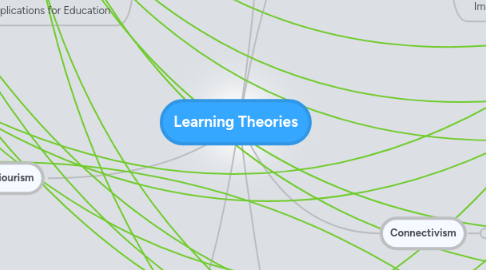
1. Constructivism
1.1. Principles
1.1.1. Mind is a network
1.1.2. Build connections by interacting with the environment
1.1.3. Construct knowledge from experience
1.2. Implications for Education
1.2.1. Problem based learning
1.2.2. Project based learning
1.2.3. Teacher as facilitator
1.2.4. Authentic tasks
1.2.5. Discovery learning
1.2.6. Collaborative learning
2. Behaviourism
2.1. Principles
2.1.1. Reward/Punishment system
2.1.2. Stimulus response
2.1.3. Cues
2.2. Implications for Education
2.2.1. Drilling, memorization, practice
2.2.2. Teacher directed
2.2.3. Lecture
3. Media Ecology
3.1. Principles
3.1.1. Media is an environment
3.1.2. The interactions of communications media, technology, technique, and processes with human feeling, thought, value, and behavior
3.2. Implications for Education
3.2.1. Media is an environment for learning
3.2.2. Increased use of technology
3.2.3. The classroom can exist online
4. Connectivism
4.1. Principles
4.1.1. Learning occurs as part of a social network of many diverse connections and ties
4.1.2. Make connections with others which will strengthen the learning process
4.1.3. Learning may reside in non-human appliances
4.1.4. Learning happens in many different ways
4.1.5. Learning is a knowledge creation process
4.1.6. Learning rest in a diversity of opinions
4.1.7. Ability to see connections between fields, ideas, and concepts is a core skill
4.2. Implications for Education
4.2.1. Teacher provides guidance
4.2.2. Learning is driven by the individual
4.2.3. Instead of teaching content, teacher teaches the tools the student will use to enable their own learning
4.2.4. Students use technology to facilitate learning
5. Cognitivism
5.1. Principles
5.1.1. Scaffolding - make connections
5.1.2. Build off of prior knowledge
5.1.3. Mind is not a blank slate
5.2. Implications for Education
5.2.1. Practice for retention
5.2.2. Organization
5.2.3. Mneumonics
5.2.4. Symbolism
5.2.5. Mental Maps
6. TPACK
6.1. Principles
6.1.1. identify the nature of knowledge required by teachers for technology integration in their teaching
6.1.2. complex interplay of three primary forms of knowledge: Content (CK), Pedagogy (PK), and Technology (TK)
6.1.3. Pedagogical Content Knowledge (PCK), Shulman’s idea of knowledge of pedagogy that is applicable to the teaching of specific content
6.1.4. Technological Content Knowledge (TCK), the knowledge of the relationship between technology and content
6.1.5. Technological Pedagogical Knowledge (TPK), which emphasizes the existence, components and capabilities of various technologies as they are used in the settings of teaching and learning
6.2. Implications for Education
6.2.1. Teachers need to understand technology in order to teach it in the classroom
